Perplexed about Can Air Pollution Cause Sinus Problems or not? Don’t worry we will give you a complete overview of whether air pollution can cause sinus problems or not. So, keep reading!
Sinus problems can be a real pain, quite literally. Sinuses are air-filled cavities in the skull (four pairs of them) and help filter and humidify the air we breathe. However, when inflamed, they can cause various symptoms, including headaches, facial pain, and a stuffy nose. In severe cases, sinusitis (inflammation of the sinuses) can even lead to fever and difficulty breathing.
According to the Environmental Protection Agency (EPA), there are many different sources of air pollution, both indoors and outdoors. These include things like vehicle exhaust, emissions from factories and power plants, as well as chemical fumes from cleaning products and other chemicals.
In this article, we’ll take a look at the link between air pollution and sinusitis, can Air Pollution cause sinus problems as well as symptoms and what you can do to relieve your symptoms. Let’s get started!
Sinus Problem Due to Air Pollution

Air pollution has been linked to various health problems, including difficulty breathing, heart disease, and cancer. However, air pollution can also have a less obvious impact on our health.
Studies have shown that air pollution can trigger or worsen sinus problems. This is because pollutants can irritate the lining of the nose and sinuses, causing inflammation and swelling. In addition, air pollution can make it difficult for mucus to drain properly, leading to congestion and infection.
If you suffer from sinus problems, it’s important to take steps to protect yourself from air pollution. This includes staying indoors on days when the air quality is poor, wearing a face mask outdoors, and avoiding smoky environments. Taking these precautions can help reduce your risk of sinus problems.
What Are Sinus Problems, and What Causes Them?

Most people have had a sinus infection at some point. Sinus infections, or sinusitis, occur when the air-filled spaces behind your cheekbones, eyebrows and jaw become inflamed. This happens when the tissue that lines the sinuses becomes irritated and swollen.
Studies have shown that the cause of sinus problems is often a viral infection, such as a cold or flu. However, it can also be caused by an allergy or irritation from Dust mites, pollen, smoke or other airborne irritants.
Types Of Sinus Problems
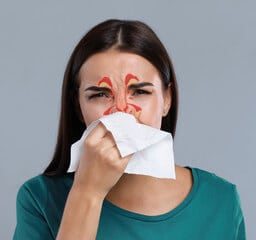
Here are some common types of sinus problem including:
Sinusitis
This is an inflammation of the sinuses that can be caused by a virus, bacteria, allergies or other irritants. Symptoms include nasal congestion, runny nose, headache, fever and facial pain. (Source)
Nasal Polyps
These are noncancerous growths that can develop in the lining of the nose or sinuses. They are often associated with allergies and can obstruct the nasal passages. (Source)
Deviated Septum
This is a condition in which the bone and cartilage dividing the nostrils is displaced to one side. It can cause difficulty breathing and recurrent sinus infections. (Source)
Allergic Rhinitis
This is an inflammation of the nose lining that occurs in response to an allergen, such as dust mites, pollen or animal dander. Symptoms include sneezing, runny nose and nasal congestion.
Air pollution affects the sinuses in the following ways:
How Does Air Pollution Affect the Sinuses?
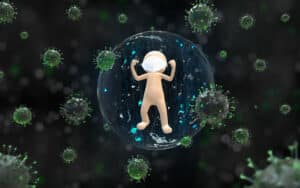
Air pollution is a mixture of particles and gases that can reach harmful levels outside and inside buildings. Exposure to high levels of air pollution can cause various health problems, including respiratory infections, heart disease, and cancer.
The sinuses are a pair of hollow cavities in the skull that are lined with mucous membranes. These membranes trap dust, bacteria, and other particles that enter the nose, preventing them from reaching the lungs. However, the sinuses can also be susceptible to pollution.
Air pollution can irritate the sinuses and lead to inflammation, pain, and congestion. In severe cases, it can also contribute to sinus infections. To protect your sinuses from air pollution, you can wear a mask outdoors and make sure to ventilate your home or office. You should also see your doctor if you experience sinus infection symptoms.
What Are the Symptoms of Sinus Problems Caused by Air Pollution?
Sinus problems caused by air pollution can include headaches, a runny nose, congestion, and facial pain. Air pollution can worsen existing sinus problems and lead to new ones.
This can lead to headaches, a runny nose, and congestion. The pollutants can also trigger an immune response, leading to facial pain. Sinus problems caused by air pollution are often worse in the morning because the pollutants have had all night build up in the sinuses.
Let’s explore those symptoms in a little more detail!
Difficulty Breathing
Several factors, including air pollution, can cause difficulty breathing. When pollutants are present in the air, they can aggravate respiratory problems and make it difficult to breathe. People with asthma or other respiratory conditions are especially at risk when exposed to high levels of air pollution.
Coughing

Coughing is another common symptom of sinus problems caused by air pollution. Pollutants in the air can irritate the lining of the nasal passages and throat, resulting in a cough.
Chest Congestion

Chest congestion is a common symptom of respiratory problems and can also be caused by air pollution. When pollutants are present in the air, they can cause the lungs to become congested and make breathing difficult.
Headache

Headaches are a common symptom of sinus problems and can also be caused by air pollution. Pollutants in the air can irritate the sinuses and lead to a headache.
Fatigue

Fatigue is a common symptom of many health problems, including sinus problems caused by air pollution. When pollutants are present in the air, they can cause the body to become tired and run down.
Sinus Pressure or Pain

Sinus pressure or pain is a common symptom of sinus problems. When pollutants are present in the air, they can aggravate the sinuses and cause pain or pressure.
Sore Throat

Sore throats are a common symptom of respiratory problems, and they can also be caused by air pollution. Pollutants in the air can irritate the throat and cause a sore throat.
What Can You Do to Protect Your Sinuses From Air Pollution?
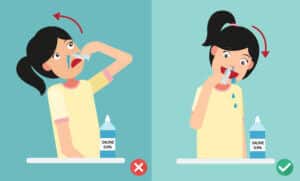
There are a few things that you can do to help protect your sinuses from air pollution. These are:
Air Purifiers
Air purifiers work to clean the air by trapping pollutants and allergens in the filters. It is important to buy an air purifier with a HEPA filter, as this filter is the most effective at trapping small particles. Check out from here!
HEPA Filters
A HEPA filter is an effective filter that is effective at trapping small particles, such as allergens and pollutants. It is important to buy an air purifier with a HEPA filter, as this filter will clean the air more effectively. Check out from here!
Air Purifying Fans
Air purifying fans work to clean the air by sucking in polluted air and releasing clean air. It is important to buy an air purifying fan with a HEPA filter, as this filter is the most effective at trapping small particles. Check out from here!
Air Purifying Mask
An air-purifying mask works to clean the air by filtering out pollutants and allergens. It is important to buy an air-purifying mask with a HEPA filter, as this filter is the most effective at trapping small particles. Check out from here!
Air Purifying Plants
Air-purifying plants work to clean the air by absorbing pollutants and allergens. They are a natural way to purify the air and are safe for children and pets. Check out from here!
The good news is that sinus problems caused by air pollution can be treated. Some ways are given next to treat these problems.
How Can You Treat Sinus Problems Caused by Air Pollution?
We can Treat Sinus Problems Caused by Air Pollution. There are a few things that you can do to help protect your sinuses from air pollution:
Nasal Irrigation
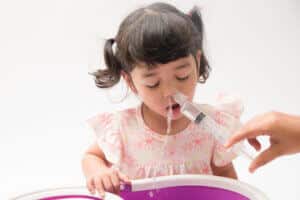
This is done using a saline solution to flush the nasal passages. It can help to clear out any mucus or debris, and it also helps to keep the nasal passages moist.
Antihistamines

These medications help to reduce the symptoms of allergies, which can often aggravate sinus problems. Furthermore, they can also help to reduce the amount of mucus produced.
Decongestants

These drugs help to relieve congestion and pressure in the sinuses. However, they should not be used for more than a few days, as they can worsen congestion if used for too long.
Corticosteroid Nasal Spray
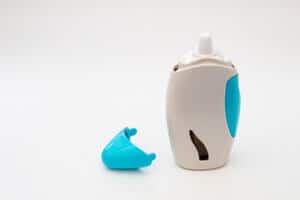
These sprays can help to reduce inflammation in the sinuses. It is a prescription drug, so it should be taken only under the guidance of a doctor.
Antibiotics

If a bacterial infection is causing sinus problems, antibiotics may be prescribed to treat it. They are usually taken for 10 days.
Immunotherapy

This is a long-term treatment that helps to build up immunity to allergens. It can be helpful for people who have severe allergies or who do not respond to other treatments.
Steps That Can Be Taken to Prevent Air Pollution-Related Sinus Problems

Here are some steps that can be taken to prevent air pollution-related sinus problems are:
- Make sure your house is well-ventilated
- Avoiding busy, congested areas
- Wearing a mask when outside
- Reduce your exposure to air pollution as much as possible.
- If you are experiencing symptoms, seek medical help.
- Try to keep your windows and doors closed as much as possible to avoid pollutants entering your home.
- Use a high-quality air filter in your home.
- Drink plenty of fluids and get plenty of rest to help your body fight infections.
FAQs
Here are some frequently asked questions about sinus problems caused by air pollution:
Can Air Pollution Cause Sinus Problems?
Yes, the environment can cause sinus problems. Pollution, dust, and other allergens can all contribute to sinus problems.
What Environmental Factors Cause Sinus Infections?
There are many potential causes of sinus infections. Allergens, pollutants, and dust can cause all trigger sinus problems. If you suspect that something in your environment is causing your sinus problems, you should see a doctor to get a diagnosis.
Can Air Cause Sinus Problems?
Yes, air pollution can cause sinus problems. Pollutants in the air can irritate the sinuses and trigger an infection. Additionally, dust and other allergens can also cause sinus problems.
What Is My House Is Causing Sinus Problems?
There are many potential causes of sinus problems in the home, from dust and pet dander to mold and mildew. If you suspect that your sinus problem is being caused by something in your home, it’s important to take steps to identify and eliminate the source of the problem. Otherwise, you may find yourself dealing with chronic sinus problems that are difficult to treat.
Can the Environment Cause Sinus Problems?
Yes, the environment can definitely cause sinus problems. There are many potential triggers for sinus problems, including dust, pollen, mold, mildew, and pet dander. If you’re allergic to any of these substances, they can cause inflammation and blockage of the sinuses, leading to symptoms like nasal congestion and a runny nose.
The Final Words
Air pollution is a serious problem that can harm your health. If you are suffering from sinus problems, you must see a doctor to get the proper treatment. You can also take steps to prevent air pollution-related sinus problems. In this article, we have discussed some steps that can be taken to prevent sinus problems caused by air pollution. Thanks for reading!
Please comment below if you have any questions left. Moreover, if you found this article helpful, then share our website AirCleansy with your friends and family. We are dedicated to helping people improve the air quality in their homes and would love for as many people as possible to learn about us.


